#march is for meta
Explore tagged Tumblr posts
Text
5 Meta Recs for March!!
March is for Meta!
But in addition to my normal linkspam I got some ideas for you to participate in meta march :D Because the theme of my Meta March is Fandom is a Community Garden <3
Commentary on Fanfic Maverick podcast.
@broomsticks really went the extra mile on Fandom Anthropology Mode for doing their commentary on this podcast. With timestamps and really good review/observations. Highly recommend <3 I mean the combo of fanfic maverick podcast + broomsticks commentary is perfection. Also it's got a part 2. I mean this is as meta as it gets!!
How can you participate? Listen to the podcast, Reblog with your own commentary! Send asks to @broomsticks!
HP Astro for Snape/Sirius Black.
@danpuff-ao3 does everything. Reads/writes/recs/podcasts/discords/mods fests... But on top of that she’s also doing HP ship synastry charts. Synastry is probably the biggest word I used on this blog. But anyway! If you got ships/characters you want to check chemistry for you know where to check. Also she is good at sorting you. I am a Puff!
How can you participate? Go check out the astro meta and you can also ask her for more details on your favorite pairings/characters because her astro asks are open!! Divination time <3
Now we are doing the crazy recs. Apparently fandom also happens outside Tumblr. On Dreamwidth!! I mean. Everybody’s got their own kink I guess. These next three recs are from Dreamwidth Q&As.
3. Q&A with eldritcher
Gosh. This is their 15 years in fandom anniversary Q&A. I really love hearing about their writing and fandom experience. They were probably in the rare group of late millenials who got their writing start on older fandom sites. Their writing process!!!! I mean there is process and then there is this! eldritcher is incredibly brilliant and also one of the best writers out there. Their sensitivity + precision is just next level.
How can you participate? This is active/ongoing and allows anon. You don't need a Dreamwidth account. So definitely check out/read/ask/comment if you vibe with the discussion/leave some love if you know their fics. The discussion already was really, really happening when I checked last.
I write stories in sets. I've very rarely done one-offs. Sets are easier for me because I think in sets and graphs. When I am interested in a new canon, I make a list of the characters, arrange them on a board with a canon relationship graph, start etching out canon character profiles for the ones I find interesting, identify the closest cluster of other characters my character-of-choice interacts with.
(continued in Q&A)
Q&A with pauraque
pauraque is my favorite writer in rare ships/rare fandoms and I really, really love the sensitivity in their characterizations. They don’t even write Snape but I am like so 100% sold on everything they write and follow their works in whatever fandom. Their discussion about their writing process is my all time fav. The detail and the clear thinking in their answers is just next level.
How can you participate? Comment!! <3 They allow anon. So you don’t need a Dreamwidth account. Definitely read and comment and leave some love if you know their fics/vibe with the discussion! It's an older discussion yeah, but meta like fic doesn't really expire :D
I always try to figure out how each character feels about the other and what they're getting out of the relationship. Especially if I'm stuck or the events of the story feel like they're not flowing naturally, I'll stop and go over in my mind what each character is feeling, what they want, and why they're drawn to the other person. I probably wouldn't spell it out that overtly in the text of the story itself, but as the author I feel like I need to be able to clearly articulate why these characters would get together (no vague stuff like "it just happened" or "it was destiny"—that's only convincing for people who already ship a pairing). If I have that solidly explained in my own mind, it'll show in the story.
(Pauraque Q&A )
Q&A with Delphi
Delphi!!!! <3 Delphi wrote Snape/Dumbledore and I became a lifelong fan. I have followed their works in some totally canon blind fandoms, I read their Snape/OMC work which also is the best Snape character study ever. YMMV. Anyway, hero worship is a thing + don't meet your hero is a thing. But definitely zero regrets after getting to do this Q&A with Delphi because they are honestly the best of fandom. Love them so much. <3
How can you participate? Comment!! <3 They allow anon. So you don’t need a Dreamwidth account. Definitely read and comment and leave some love if you know their fics/vibe with the discussion! It's an older discussion, but meta like fic doesn't really expire :D
I read my first Harry Potter fics between CoS and PoA, on a mailing list for rare book-based fandoms - something that still seems wild to me in retrospect. There was absolutely no sense of it being a phenomenon in the making in those conversations, or even anything particularly notable. Someone just said, "Hey, my kid is reading these stories, and there are some interesting adult characters and a nice sandbox to play in." I remember reading a couple of early Snape/Dumbledore stories before I read the books, as well as a few Percy fics. Hilariously, I also remember a conversation about how maybe there would eventually be some Harry/Ron futurefic, but Snape/Dumbledore would obviously end up being the biggest slash ship for the fandom. I read the first two books then, and I kept on reading whatever fic landed in my inbox, but I wasn't driven to search elsewhere for more at that point.
(continued in Q&A)
#meta#march is for meta#hp fandom#fandom meta#i got stuff for you#also recs#meta recs#recs#linkspam like always ofc#5 meta recs for meta march#squash recs#best of fandom stuff#fandom is a community garden
21 notes
·
View notes
Text

happy world otter day had to make tribute
#and make up for the fact i missed her bday in march 🙂#also pretending this counts as a mermay#inscryption#kaycee hobbes#my art#furry#otter#sea otter#ottergirl#THATS RIGHT PUPPYGIRLS ARE OUT! OTTERGIRLS ARE THE NEW META! TELL YOUR FRIENDS#please
2K notes
·
View notes
Text
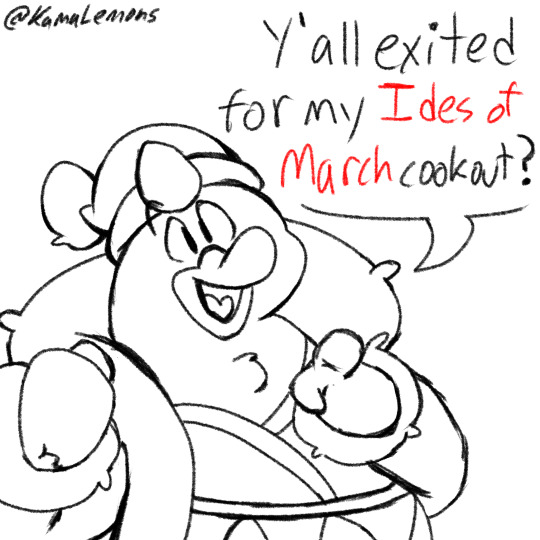
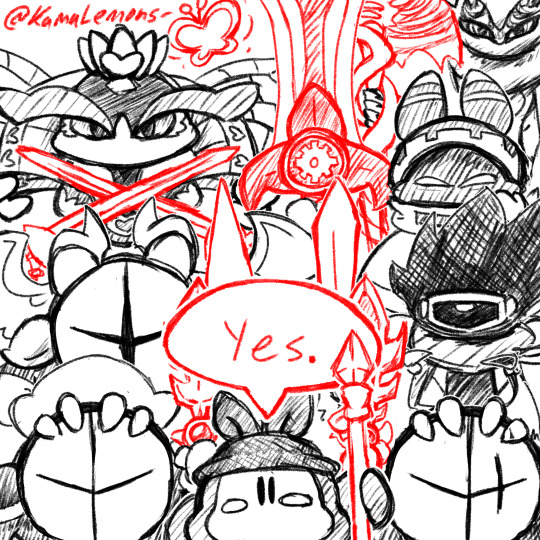
Happy Ides of March, guys! Hope nothing bad happens to the dear king on his mid march cookout
#kirby#kamalemonart#allll the character tags#let's see here...#king dedede#bandanna waddle dee#meta knight#dark meta knight#galacta knight#dark matter swordsman#magolor#queen sectonia#morpho knight#fecto elfilis#ides of march
2K notes
·
View notes
Text
How the Chantry (and Orlais) Turned Kirkwall into a Police State
One aspect of the Dragon Age series that I’ve always found odd is the way in which rather crucial political and historical context surrounding major conflicts the player must decide tends to be relegated to codices, outside materials (e.g., books), and optional dialogue with minor characters... meaning that many if not most players don’t seem to end up actually seeing it. Wicked Eyes and Wicked Hearts (Dragon Age Inquisition) in particular has become somewhat notorious for what it left out, but it’s far from unusual.
With regard to Dragon Age II, there’s a popular perception among fans that the troubles in Kirkwall can be attributed almost entirely to rogue behavior on the part of Knight-Commander Meredith and various evil blood mages. This is understandable given the overall narrative framing and Bioware’s aforementioned problem of making key context very easy to miss. But once we take a look at the full picture, it ought to be clear that the Chantry did not simply “fail” in their responsibilities towards the mages or towards the citizens of Kirkwall more broadly — they actively created and maintained the very nightmare they later professed to be dismayed about.
Moreover, despite the running Mages vs. Templars theme, the mages were hardly the only one's who suffered under Meredith's rule. Indeed, Kirkwall endured a brutal 16-year-long dictatorship (9:21-9:37 Dragon) that came into being courtesy of the Chantry and the Orlesian empire and only fell due to the mage rebellion.
Here I’ll describe in detail (with sources and citations) the story of how the Chantry turned Kirkwall into a police state and one that ultimately descended into what the writers themselves termed "genocide."
The Templar Coup of 9:21 Dragon
Our story begins with the conflict between Viscount Perrin Threnhold of Kirkwall and Emperor Florian Valmont of Orlais.
With the beginning of the Dragon Age (the era), the Orlais had experienced a major loss of territory and influence. In 9:00-9:02 Dragon (the exact dates conflict), the Fereldan Rebellion led by Maric Theirin and Loghain Mac Tir overthrew Meghren, the last Orlesian King of Ferelden (personally appointed to the position by Emperor Florian himself), and reclaimed their country’s independence after nearly a century of Orlesian occupation. These events are described in detail in The Stolen Throne. Emperor Florian, however, remained reluctant to recognize Ferelden’s sovereignty -- with peace between the two countries not being fully established until his death and the ascension of his niece Celene to the throne in 9:20 Dragon -- and may have been eager to reassert Orlesian influence in the region. Perrin Threnhold, meanwhile, ascended to the position of viscount of Kirkwall (also formerly occupied by Orlais) in 9:14 Dragon. At some point during this volatile period, Threnhold decided to raise money by charging what the Orlesians regarded as unreasonably high tolls for passage through the Waking Sea, which also controlled Orlais’s sea access to Ferelden and its capitol, Denerim.
For reference, here’s a map with my highlights:
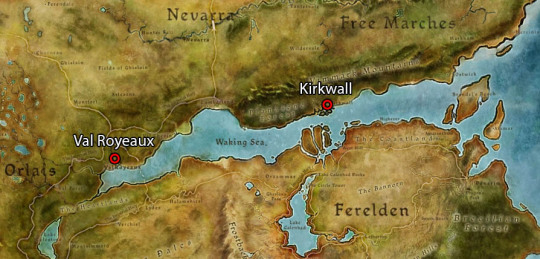
The Orlesian Chantry, founded by Kordillus Drakon I (the first emperor of Orlais), had from the beginning been dominated by Orlesian interests. According to World of Thedas vol. 1 (p. 56): “The Orlesian capital, Val Royeaux, is home to the Chantry’s Grand Cathedral, the center of the Andrastian religion’s power. Over multiple Blights, the Orlesians have used the Chantry to expand their influence beyond the nation’s impressive borders, notably to the north into Tevinter territory and southeast through Ferelden.” The Chantry, not surprisingly, had backed the Orlesian invasion and occupation of Ferelden, most recently under Divine Beatrix III (probably) and Grand Cleric Bronach of Denerim. It should be noted that this is all part of a pattern of highly-aggressive and imperialistic behavior that has persisted for centuries from the early years up to (potentially) the events of Dragon Age Inquisition.
It also cannot be emphasized enough that the Templars are the Chantry’s army and were created by the Chantry in the first place. They do not simply hunt and guard mages; they fight the Chantry’s wars and carry out its policies. Quote: “the Order of Templars was created as the martial arm of the Chantry” (Codex: Templars). According to First Enchanter Halden of Starkhaven (8:80 Blessed), “While mages often resent the templars as symbols of the Chantry's control over magic, the people of Thedas see them as saviors and holy warriors, champions of all that is good, armed with piety enough to protect the world from the ravages of foul magic. In reality, the Chantry's militant arm looks first for skilled warriors with unshakable faith in the Maker, with a flawless moral center as a secondary concern. Templars must carry out their duty with an emotional distance, and the Order of Templars prefers soldiers with religious fervor and absolute loyalty over paragons of virtue who might question orders when it comes time to make difficult choices. It is this sense of ruthless piety that most frightens mages when they draw the templars' attention: When the templars are sent to eliminate a possible blood mage, there is no reasoning with them, and if the templars are prepared, the mage's magic is all but useless. Driven by their faith, the templars are one of the most feared and respected forces in Thedas” (Codex: Templars). Likewise, a Chantry official confirms that the Templars are both “the watchers of the mages and the martial arm of the Chantry” (Codex: Seekers of Truth). In Dragon Age Origins, the (unwillingly) Templar-trained Alistair elaborates, “Essentially they’re trained to fight. The Chantry would tell you that the templars exist simply to defend, but don’t let them fool you. They’re an army... The Chantry keeps a close reign on its templars. We are given lyrium to help develop our magical talents, you see… which means we become addicted. And since the Chantry controls the lyrium trade with the dwarves… well, I’m sure you can put two and two together... The Chantry usually doesn’t let their templars get away, either.”
In response to Threnhold’s intolerable restrictions on the Orlesian navy’s movements in its traditional sphere of influence, Divine Beatrix III, an acknowledged “friend of the emperor” (and predecessor to Divine Justinia V of DAI), ordered the Kirkwall Templars under Knight-Commander Guylian to force open the Waking Sea. Viscount Threnhold retaliated for this obviously-illegal military interference by ordering the Templars expelled from Kirkwall and later executing the knight-commander. Then-Knight-Captain Meredith Stannard led the remaining Templars to storm the Keep and arrest Threnhold before appointing a weak viscount unwilling or unable to resist her control.
From Kirkwall: City of Chains by Brother Ferdinand Genitivi (Codex: History of Kirkwall: Chapter 4):
Taxes were crippling and Perrin Threnhold used the ancient chains extending from “the Twins” standing at Kirkwall's harbor—unused since the New Exalted Marches—to block sea traffic and charge exorbitant fees from Orlesian ships. The Empire threatened invasion following the closure of the Waking Sea passage, and for the first time, the Chantry used the templars to pressure the viscount. Until that point, the templars had done nothing to counter the Threnholds even though, as the largest armed force in Kirkwall, they could have. Knight-Commander Guylian's only written comment was in a letter to Divine Beatrix III: “It is not our place to interfere in political affairs. We are here to safeguard the city against magic, not against itself.” The divine, as a friend to the emperor, clearly had other ideas.
In response, Viscount Perrin hired a mercenary army, forcing a showdown with the templars. They stormed the Gallows and hung Knight-Commander Guylian, igniting a series of battles that ended with Perrin's arrest and the last of his family's rule. The templars were hailed as heroes, and even though they wished to remain out of Kirkwall's affairs, it was now forced upon them. Knight-Commander Meredith appointed Lord Marlowe Dumar as the new viscount in 9:21 Dragon and she has remained influential in the city's rule ever since.
Given that this was written by a Chantry scholar, the self-justificatory rhetoric surrounding the viscount and the Chantry-instigated coup ought not be surprising. It appears, however, that in Kirkwall itself popular perceptions of Viscount Perrin Threnhold are in fact fairly polarized.
Whereas Brother Genitivi calls Perrin’s father Chivalry Threnhold “a vicious thug who took power through a campaign of intimidation” and Perrin Threnhold “even worse,” an unnamed servant writing 7 years after the coup paints a rather different picture (Codex: Viscount Marlowe Dumar):
What happened to Viscount Perrin Threnhold was a travesty. I served in the Keep, and my blood boils when I hear people call him a tyrant. He was a good man who tried his best to free Kirkwall from the control of those who use power for their own purposes. It's always been that way here, hasn't it? Long ago it was the Imperium. Then it was the Qunari, then the Orlesians, now the templars... when have we ever ruled ourselves? He tried to kick those templar bastards out and give us real freedom, and what did it get him?
Whether Threnhold was an evil tyrant or a nationalist hero (or both or something else entirely) is beside the point, however. He was not overthrown for mistreating the citizens of Kirkwall; he was overthrown for opposing Orlais and the Templars (acting as an arm of Orlesian imperialism and in defiance of their official duties). Seneschal Bran, himself no fan of either Threnhold or the Templars (and the only character to ever discuss the coup out loud), points this out in an easy-to-miss optional conversation in Act 3.
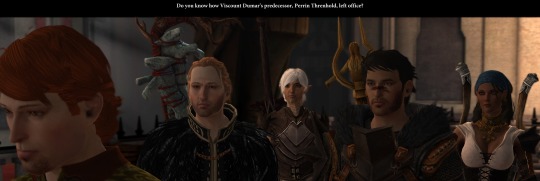


Hawke: What happens if they [the Templars] don’t like the [nobility’s] choice [of viscount]?
Seneschal Bran: Do you know how Viscount Dumar’s predecessor, Perrin Threnhold, left office? He was a tyrant, certainly, but his rule was not ended until he actively sought to expel the templars. “The good of all” is inexorably tied to what is good for the templars.
It’s unclear whether Knight-Captain Meredith was acting on her own initiative in toppling Threnhold or whether she received prior encouragement from the Chantry, but either way, what is certain is that the Chantry moved quickly to legitimize her actions and bolster the new order. Moreover, the intent to seize power for the Chantry and its military forces rather than “liberate” Kirkwall from the depredations of a tyrannical viscount can be seen in the way they illegally imposed their own viscount (one kept submissive through threats of violence) rather than allowing the people to choose or at the very least following accepted selection procedures (i.e., allowing the nobility to vote on the next viscount). Indeed, this refusal to let the nobility select the viscount as per tradition is the basis of Orsino's protest at the beginning of Act 3.
In any event, Grand Cleric Elthina, as the highest-ranking representative of the Chantry in Kirkwall (appointed to her position by Divine Beatrix III herself around 20 years before Act 1) and thus exercising authority over its Templars, presided over the show trial at the end of which Threnhold was imprisoned and later murdered in his cell. Then she rewarded Meredith with a promotion.
According to the codex for Knight-Commander Meredith:
She is credited with removing the previous viscount, Perrin Threnhold, from his position after he attempted to have the templars expelled from the city in 9:21 Dragon. The acting knight-commander was arrested and executed, and Meredith led a group of templars into the heart of the Keep to capture Threnhold. He was tried and imprisoned three days later by Grand Cleric Elthina and died from poisoning two years later. Meredith was subsequently elevated to her current position.
While merely implied here, Elthina is explicitly confirmed to have given Meredith the position of knight-commander in the first place in World of Thedas vol. 2 (p. 193):
Following Threnhold’s arrest, Grand Cleric Elthina appointed Meredith as the new knight-commander. At Knight-Commander Meredith’s suggestion, a new viscount was chosen: a man named Marlowe Dumar.
Then in blatant violation of Kirkwall’s own laws and traditions -- again, dictating that the viscount be chosen by the nobility -- the Chantry had allowed newly-installed Knight-Commander Meredith to select the new viscount. If approached in the Templar-occupied Viscount’s Keep and spoken to in Act 3, Seneschal Bran will explain:
Bran: When a line is judged unfit, or ends, we appoint from Kirkwall’s elite. Or we would, if the situation was normal. But it is not.
Hawke: Who nominates a new viscount?
Bran: A consensus of the nobility. Normally. And a willing nominee.
It seems to be the general consensus that Marlowe Dumar was chosen specifically because he was weak and willing to play the role of Templar/Chantry puppet (a subheading in Dumar’s WoT v2 entry even explicitly calls him “The Puppet”). Meredith, after all, is not only responsible for his appointment but has been threatening him into compliance from the very beginning.
Again, Brother Genitivi writes quite bluntly:
Knight-Commander Meredith appointed Lord Marlowe Dumar as the new viscount in 9:21 Dragon and she has remained influential in the city's rule ever since.
And quoting once more from the unnamed servant:
Now the Chantry has chosen Lord Marlowe Dumar as his replacement. After weeks and weeks of arguing, after telling the nobility that they would be choosing their viscount, after everyone saying it was time to use a new title—why not "king"? Why keep using the name imposed by the Orlesians? And after all that, the Chantry chose him. I suppose I can see why—everyone thinks he has the spine of a jellyfish, and it does seem that way.
Truly, he has the templars on one side, the nobility on the other, and everyone expects him to solve all their problems—yet he has no power to actually accomplish it. He keeps the peace as best he can, and I think he does a good job even if no one else does.
Likewise, to quote from Marlowe Dumar’s entry in World of Thedas vol. 2 (p. 184-185):
The new knight-commander, Meredith, appointed Marlowe to the seat, much to his surprise. Just before he was crowned, he met in private with the knight-commander at the Gallows. Marlowe was escorted, surrounded by grim templars, to Meredith’s well-appointed office, and there, she explained her reasons for the choice. Kirkwall was filled with entitled degenerates... “With my help, you will turn this city around,” she said. “We will be allies.” Meredith’s message was clear: Remember who holds power in Kirkwall. Remember what happened to Threnhold when he overreached. To drive her point home, she presented Marlowe with a small carven ivory box at his coronation. The box contained the Threnhold signet ring, misshapen, and crusted with blood. On the inside of the lid were written the words “His fate need not be yours.” Marlowe ruled Kirkwall without incident for almost a decade, in no small part thanks to Meredith’s backing. During his reign, the templars grew even more powerful, and the knight-commander’s influence was evident in almost every one of Marlowe’s decisions.
And from Meredith’s entry in WoT vol. 2 (p. 193):
Meredith presented Dumar with a carved ivory box at his crowning. All present witnessed the viscount going white as a sheet as he opened it... It is not known what the box contained, but the reaction from Dumar made its importance to him obvious. What is certain is that Dumar never openly or strongly defied the templars. Over the course of his reign, Meredith’s grip on Kirkwall grew ever tighter, and Dumar’s failure to act absolutely contributed to the events that led to the mage rebellion.
According to Lord Bellamy, “a longtime political ally of Dumar’s” (p. 193):
“Dumar had a good heart. A good heart and a weak will. On his own he might have made a good leader, given time. But he wasn’t on his own. The knight-commander was always there, looking over his shoulder. She let him know she was watching, that he wore the crown at her sufferance. Meredith appointed him. This was a nobleman of only moderate wealth, with little influence. She knew she could control him and there was little he or anyone else could do about it.”
Ultimately, the coup not only secured Chantry control over Kirkwall but furthered their (and the Orlesian Empire’s) geopolitical interests in the Free Marches as a whole. After all, the “Free Marches is [sic] best known as the breadbasket of Thedas. Its farms along the banks of the great Minanter river are the source of much of the continent’s food” (World of Thedas vol. 1, p. 65), and as with many a real-world “breadbasket,” its natural abundance and misfortune of lying between multiple empires had made it the target of one invasion and occupation after another. After the slave revolt of 25 Ancient toppled the Tevinter Imperium’s hold over the region (see Codex: History of Kirkwall: Chapter 2), the city-state of Kirkwall fell to Qunari invasion in 7:56 Storm, then invasion and occupation by the Orlesian Empire in 7:60 Storm, and finally gained its independence about 45 years later in 8:05 Blessed (see Codex: History of Kirkwall: Chapter 3). Prior to the Chantry-instigated coup, Kirkwall had enjoyed independence under a locally-chosen viscount for around 115 years, with Viscount Perrin Threnhold himself ruling for 7 years.
Other city-states of the Free Marches have likewise fallen under the Chantry’s sphere of influence (if not outright control):
Starkhaven is ruled by the Vael family. According to the codex for The Vaels, “They remain devout, dedicating at least one son or daughter per generation to become a cleric in the chantry.” The sole potential heir to the throne of Starkhaven is of course our DLC companion Sebastian Vael, “The Exiled Prince.” To quote from his first codex: “Sebastian Vael is the only surviving son of the ruling family of Starkhaven, which was murdered in a violent coup d'etat. Sebastian cannot forget the irony that he still lives only because his family was so ashamed of his drinking and womanizing that they committed him to the Kirkwall Chantry against his will… Since then, his belief in the Maker and His plan for Thedas have been unshakable. Embracing his new role, Sebastian took vows of poverty and chastity to become a sworn brother of the Chantry... until word of his family's deaths forced him to take up worldly concerns once again.” Elthina appears to have been playing mind games with Sebastian from the very beginning -- first she agrees to have him confined in her Chantry, then poses as a secret benefactor helping him escape from her clutches, with the revelation of her identity as said pretend benefactor leading him to embrace her authority and the life of a Chantry brother with genuine enthusiasm (see the Sebastian short story or his WoT v2 entry for details). After his family’s murder, Elthina urges him to remain with her rather than reclaim the throne. Yet when he gives up on seeking the throne and actually does attempt to return to the Chantry during “a crisis of faith,” he is “turned away by Grand Cleric Elthina, who believed he had not yet committed fully to either course” (see Codex: Sebastian - The Last Three Years), leaving him confused and even more under her thrall than ever.
Ostwick is dominated by the devout, staunchly pro-Chantry Trevelyan family. According to the codex for Trevelyan, the Free Marcher: “It is an old and distinguished family, in good standing among its peers, and with strong ties to the Chantry. Its youngest sons and daughters—those third- or fourth-born children with little chance of becoming heirs—often join the Chantry to become templars or clerics.”
Tantervale is certainly... special. According to WoT vol. 1 (p. 71): “Chantry rule is all but absolute in Tantervale, earning the city its dour reputation. The city guard is obsessed with enforcement. A street urchin would get a year in the dungeon for something that would get him a pat on the back in Orlais” (p. 71).
But let us return to Kirkwall, shall we?
"The Puppet”: The Reign of Viscount Marlowe Dumar (9:21-9:34 Dragon)
Viscount Marlow Dumar’s status as an impotent tool of the Chantry and its Templars appears to be common knowledge in Kirkwall. Various characters, from city guards to lowlifes like Gamlen, casually refer to Meredith as if she is head of state and defer to her authority.
Immediately upon approaching the gates of the city in the first quest of the game, The Destruction of Lothering (Act 1), the following exchange occurs:
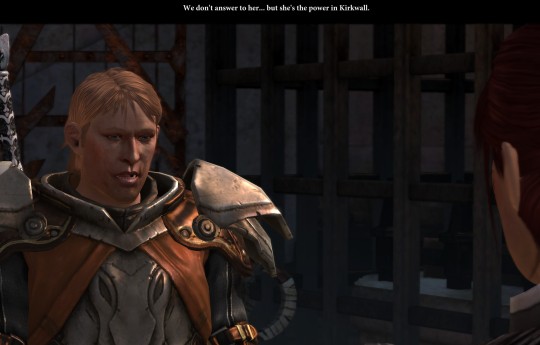


Guardsman Wright: So Knight-Commander Meredith wants us to sort you all out. Most of you are getting right back on your ships, though.
Hawke: That's a templar title. Why would a city guardsman answer to the templars?
Wright: We don't answer to her... but she's the power in Kirkwall. Don't know what would happen if the viscount went against something she wanted... But he's sure never taken that chance.
Likewise, if asked about “the word on the street,” Corff the bartender remarks as early as Act 1, “People say Meredith's the real power in Kirkwall, not the Viscount. Even Dumar answers to her.”
Ordinary citizens appear terrified of Meredith, and with good reason. During the quest Enemies Among Us (Act 1, set in 9:31 Dragon), we get the following exchange with the sister of a Templar recruit:
Macha: I pleaded with him not to join the Order, but he wouldn't listen. You hear dark rumors about the templars and Knight-Commander Meredith. And now my brother is gone.
Hawke: (“Are templars so bad here?”) In Lothering, some templars died protecting villagers. I never heard any dark rumors.
Macha: And those are the stories my Keran adored. But it is not like that here, serah. There is a growing darkness in the order. They prowl the streets in packs. Hunting. And now, they say their duties put them above us, that they have the right to... take people from their homes. It is frightening.
Hawke: (“Tell me about Meredith”) What do people say about Knight-Commander Meredith?
Macha: Oh, she has many admirers. They laud the service she does in keeping the mages in check. But others say she is terribly fierce and utterly without pity. That she sees demons everywhere. It is dangerous even to whisper such things. People harboring escaped mages just disappear. Templars interrogate and threaten passers-by. My friend has a cousin who’s a mage, and she says he was made Tranquil against his will. You hear more with each passing day.
Of course, Knight-Commander Meredith’s reign over the Gallows was notoriously brutal long before she came into contact with Red Lyrium. Writing 3 years after the coup (but 7 years before Act 1), in 9:24 Dragon, Brother Genitivi remarks that "Kirkwall has been a tinderbox since becoming the center of templar power in eastern Thedas." As early as Act 1, mages in the Gallows can be heard crying out, “This place is a prison,” and “Knight-Commander Meredith would kill us all if she could.” When asked if mages are imprisoned, the guardsman replies, “Used to be, back in the Imperial days. They kept slaves here until the rebellion. Now the templars run it and use it to lock up their mages. Guess not much has changed” (The Destruction of Lothering, Act 1). Karl Thekla’s final letter before being turned Tranquil (with such illegal uses of the Rite having been repeatedly reported to Meredith) “said the knight-commander was turning the Circle into a prison. Mages are locked in their cells, refused appearances at court, made Tranquil for the slightest crimes” (Tranquility, Act 1). If Hawke questions the truth of these accusations, Anders responds, “Ask any mage in Kirkwall. Over a dozen were made Tranquil just this year. The more people you ask, the worse the rumors become.” (Elthina also appears to be aware at least to some extent of the subsequent ambush, in which a Tranquil Karl was used as bait to ensnare his former lover).
According to the short story Paper & Steel (focusing on Samson): “Under Meredith, freedom was a cruel dream for Kirkwall’s Circle mages. They were often locked in their cells, watched night and day by templars who were told any step out of line was suspicious. All those young magelings, told that magic was a curse, that they were dangerous, and that they had to be shut indoors all their lives looking out through those windows. Some went mad. Others, mad or not, tried jumping.” And from First Enchanter Orsino’s entry in World of Thedas, vol. 2 (p. 195): “Every time a mage died by their own hand, Orsino would hear Maud’s final words to him: 'This is no life.’ The templars didn’t seem to care about the suicides. Most had the courtesy to say nothing at all, but some would snigger when they thought no one was listening. 'One less to worry about.’ ‘The only good mage is a dead mage.’ Orsino’s anger at the templars grew...” (Note that this began long before Orsino became first enchanter in 9:28, three years before the start of the game). It's also worth noting Knight-Captain Cullen Rutherford quite explicitly attained his position as second-in-command of the Kirkwall Templars position because of his anti-mage extremism, later including violence against those perceived as mage sympathizers and their families.
To name more specific abuses, the Gallows features whipping posts (with dialogue confirming the reliance on whipping) and multiple other medieval torture devices, including a rack, a pillory, and iron maidens. We also see numerous references to casual beatings, sexual assaults, forced Tranquility and facial branding, long-term confinement in dark cells, and permanent family separation (e.g., Emile du Launcet). Escape attempts are typically punished with summary execution, according to multiple sources (e.g., Ser Thrask, Ser Karras, Grace). According to Ser Thrask, the most sympathetic Templar (besides Carver), kindness to mages would be a "badge of shame" among among his colleagues. For more, I recommend checking out the “DA2 mage rights reference post” by @bubonickitten. Again, note that these are cruelties largely occurring prior to or during Act 1, long before Meredith started going insane due to Red Lyrium.
If Feynriel is forced into the Circle at the end of Wayward Son (Act 1), the ex-Templar Samson says, “I hear they got your boy Feynriel locked up in the Circle. Bad business, that. It ain't all templars that're bad. It's hard luck being born a robe, but most places, they make it work. That bitch Meredith runs the Order in this town like her private army. You don't toe the line, you end up on the next corner here in Darktown. I don't think you got to hate mages to love the Order. But Meredith don't agree.” Samson, it should be remembered, had been expelled from the Templar Order for passing love notes from the mage Maddox to his lover. For the crime of “corrupting the moral integrity of a templar,” Meredith ordered Maddox turned Tranquil. According to Cullen in Before the Dawn (DAI), “Knight-Commander Meredith wielded the brand for far lesser offences, believe me."
Ordinary citizens appear to be well aware of at least some of Meredith’s reign of terror in the Gallows, given that various NPCs (including some who do not personally know any inmates) will refer to it. During Tranquility (Act 1), for example, a mob of Ferelden refugees threatens the party over fears that the latter intend to turn in “The Healer of Darktown” to the Templars. One exclaims, "We know what happens to mages in this town. And it ain’t gonna happen to him." Moreover, the knowledge is sufficiently widespread as to have reached faraway countries. A note dated 9:35 (set between Acts 2-3) from a mage of the Hossberg Circle in the Anderfels expresses utter horror: “I have heard that in the Kirkwall Gallows, mages are locked in their cells with barely room to stretch, let alone exercise. I can promise you that any mage of the Anderfels would be stark raving mad after a week of such treatment... No wonder Kirkwall has such trouble with blood mages” (WoT v2, p. 173).
And through all of this, Meredith has the support of the Chantry and more specifically Grand Cleric Elthina.
Not only did Elthina appoint Meredith to her position in the first place (WoT v2, p. 193), but if asked her opinion on Meredith in Act 1, Elthina snaps, “Gossip is a sin, child. Knight-Commander Meredith has an admirable devotion to her duties. It is not my role to form opinions on her character.” An odd statement to make about a subordinate, since Meredith reports to her directly (as knight-commanders legally do to the nearest grand cleric). The codex for Knight-Commander Meredith confirms at as of the end of Act 2, “she enjoys the grand cleric's full support and has free rein in Kirkwall as the commander of its most powerful military force.” According to Elthina’s codex, many claim that Elthina “allows Knight-Commander Meredith more leeway with each passing year.” According to World of Thedas vol. 2, which tries to put a more positive spin on Elthina’s role, her detractors “say her stubborn refusal to exercise her Chantry-given authority allowed the conflict between the templars and mages to escalate, finally resulting in the disastrous mage rebellion of 9:37 Dragon... Since Elthina was loath to exploit her authority as grand cleric, she refused to order either the mages or templars to stand down when tensions flared. Many believe that she could have forced one side to retreat by showing her support for their position, but Elthina refused to take sides” (p. 196-197). This is at best an abdication of responsibility to dependents for someone intent on remaining in power.
Moreover, Elthina’s dominance over Kirkwall appears to depend in large part on at least appearing to manage Meredith and her troops. According to her codex, “People frequently turn to her to mediate disputes—particularly those involving the powerful Templar Order, over whom she holds authority as the Chantry's ranking representative.” So Meredith as military leader rules both the Circle and the city-state through fear and violence, while Elthina maintains her power by playing Good Cop to Meredith's Bad Cop. Both then maintain a pretense of legality and legitimacy by fronting Viscount Dumar as the public face of the regime.
And this dual-power system works quite well for them -- at least until Meredith starts losing her mind under the influence of the Red Lyrium idol.
[A link will later be provided for Part 2 on Escalation and Direct Rule. If I ever do get to it 😭😭😭]
#dragon age 2#dragon age#dragon age lore#dragon age meta#da meta#chantry critical#anti chantry#anti orlais#templar critical#anti templar#da2#knight commander meredith#meredith stannard#kirkwall#kirkwall gallows#grand cleric elthina#elthina critical#Cullen critical#viscount marlowe dumar#orlais#free marches#orlais critical
637 notes
·
View notes
Text
You know when you think about it the line “What is this, wash and wear” is actually deeply metaphorical and represents the core duality of Whizzer and Marvin. Marvin clings to an easy, stereotypical world. He craves the American dream and nuclear family, his clothes reflect that. He doesn’t want to stick out, so he dresses in “wash and wear”, he is just another perfect family man. Whizzer is the antithesis of him, he despises what drab clothes represent. He chooses to stick out, to be stylish, to reject society and its boxes. He craves individuality, and is not afraid to be himself. In a way, his clothes are also a crutch, a way to hide. Whizzer hides his insecurity behind flashy clothes and an almost too open persona— he hides by presenting a version of himself he isn’t ashamed of— and Marvin hides in plain sight by making himself blend in.
Also, the tone in which Whizzer speaks the line is important. Functionally, they use their clothes in the same way, but Whizzer seeks to belittle Marvin for his tactics of hiding. Whizzer thinks he is above Marvin in this way by allowing himself to be “free”, even if his version of freedom isn’t quite true. He thinks Marvin clinging to the idea of a tight knit family is pathetic. He makes fun of Marvin’s clothes as a roundabout way of telling him to embrace himself, but this is where his own character flaws come into play. Whizzer is mean, he chooses to pick on Marvin’s insecurity, he mocks the clothes his boyfriend wears fully knowing it’s how they both hide from the world.
Here’s the video that inspired this if anyone’s interested
youtube
#it’s entirely possible I’ve lost my mind#I’ve been listening to a video of Andy Randy#saying what is this wash in wear for about 25 minutes#but tis the price for proper analysis#falsettos#Falsettoland#march of the falsettos#Whizzer brown#whizzer falsettos#marvin falsettos#I am not tagging Marvin gardens#I am a proud hater of that name#his name is Marvin falsetto#trust me guys#falsettos analysis#falsettos meta#sort of#my friend thinks I’m insane#bugzrcool if you see this you’re right#falsettos has ruined me
98 notes
·
View notes
Text
Everyone so far seems to be theorizing Amane’s victim as her dad, her mom, or an unnamed child also in the cult. I’ve got my own theory - it was Gozake.
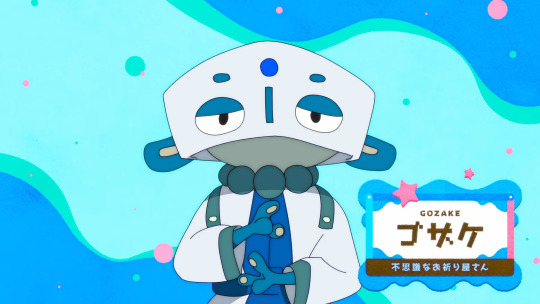
That’s Gozake, from Magic. The blue guy. He’s one of the four main figureheads of the cult, and possibly a music teacher of some kind to Amane, conducting her to sing in Magic. The very first shot of The Purge March is Amane playing the drums.
The mindscape Amane’s wield flags representing the four cult leaders (teachers? elders? propaganda peddlers? high up members? whatever, important cult people), but Gozake’s flag in particular is given special attention.

Same color scheme, same three dots over a narrow rectangle like design, same ear thingy to the side, same orb-like design features - that’s Gozake. Before we see it flying though, we see it crumpled up on the floor by Amane’s feet, something not true for any other flag.

We then see an Amane messing up her flag routine, dropping Gozake’s flag in particular and falling over. The other Amane looms over her, preparing to punish her for a failure related to Gozake. Once the punishment starts, rain pours down.
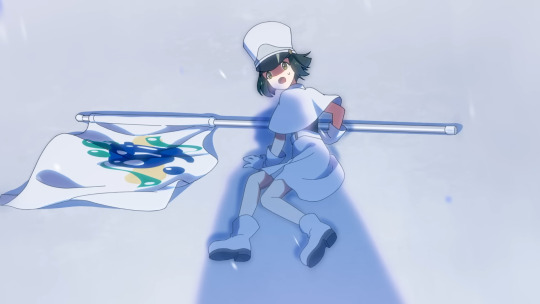

Then, the punished Amane begins to drown. You can even see the flag while she’s sinking.
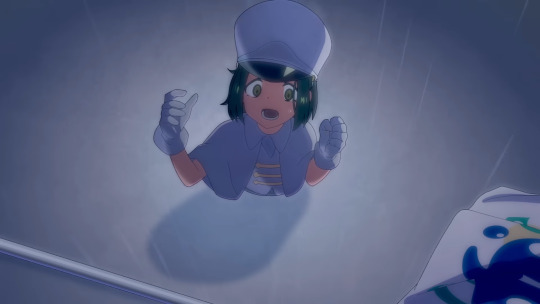
She drowns further, and we get another shot of just the flag, lying on the ground, and then the drowning Amane reaching up towards it. She’s reaching toward Gozake, the one responsible for drowning her.
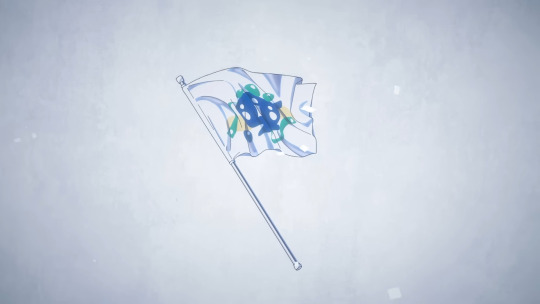
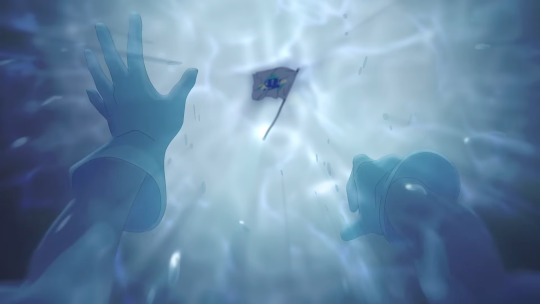
And he is the one drowning her. We see it directly in Magic.

It cuts to the real world, with Amane actually being drowned, and her placed below the one drowning her like she is placed below the flag.

Take note of the framing, with one hand stretching from out of frame.


I can’t find a better picture for her undercover card, but her location shows a bathroom. Undercover also has a shot of a victim lying on a blue tiled floor (we can’t see the floor, but the shower in Purge March has blue and green wall tiles) with water coming down. Blue and water are representations of Gozake (Amane’s character color is aqua), and it’s framed as a single hand stretching out while the rest is (mostly) obscured, and takes place in the bathroom (or at least a bathroom) that Amane was drowned by Gozake in.
Throughout the MV, there’s a lot of blue, too. Amane’s school uniform is blue, the cloth she heals the cat with is blue (the cloth later becomes bloody, another thing representing Gozake being damaged), the sky and general background and lighting is blue. Symbols of Gozake are present everywhere in the MV.
The suit man with the briefcase could be Gozake, I’m not sure. Gozake would fit the profile - a cult member, adult male, disapproving of medicine, willing to put Amane in harm’s way - but I don’t have further evidence.

Before Amane goes all in on the cult’s doctrine, she has an umbrella, but it’s unopened. The baton she uses to kill and to represent her as fully converted and the opening umbrella are overlayed.


The lyrics show her motivation for the murder, as both a means of protection and revenge. She’s been horrifically abused for years, and has taken on the role of the punisher to avoid being the punished.
“It’s my turn to tear you apart / So there is no second time, I’ll give back the judgment that you gave to me / It’s now your turn to say that hopeless “I’m sorry” / You’re sorry? I don’t care! / Please, go ahead and die already / Remember MY cries, MY repents, MY words of “I’m sorry” that I said to you?”
Beyond showing a lot of resentment and disdain for the one she’s speaking to - her victim - the phrasing clearly shows that she’s not just punishing a sinner, she’s turning the tables. She’s returning the favor to someone who’s been violent to her in the past.

The umbrella is symbolically her murder weapon and what she uses to punish others, but also literally and obviously a tool to protect from the rain. What she uses to kill is what protects her from Gozake. She can’t take the abuse anymore and tries to become the cult sanctioned violent avenger that’s hurt her so many times. She can’t be the victim if she’s the perpetrator.

The final shot has her over the corpse, having tracked in water from the rain. The puddles lead right to it and the framing is the same as both the Undercover victim and the one drowning her - a single hand, reaching from out of frame.
Amane killed Gozake.
#illia original#milgram#the milgram project#momose amane#amane momose#gozake#the purge march#magic#theory#meta
594 notes
·
View notes
Text
Ides of Magnus

I'm not saying Elias KILLED her on the Ides of March (though I'm sure he'd have gotten a kick out of it)
I AM saying he for sure knew what day it was when he reported it
(and probably, so did Mr. Jonny Sims, Writer Man)
#gertrude robinson#tma gertrude#the magnus archives#tma#tma meta#magnuspod#the magnus pod#magnus pod#the magnus institute#magnus archives#ides of march#the ides of march
1K notes
·
View notes
Note
Oooo starstruck dee has little stars at the bottom of her feet! Are they just aesthetic or would they make imprints into the ground? (like pawprints)
exactly like that! though she's not the only one...
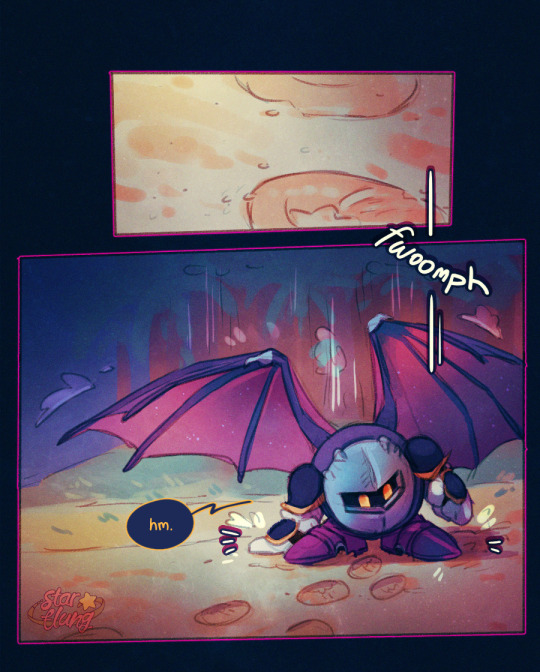
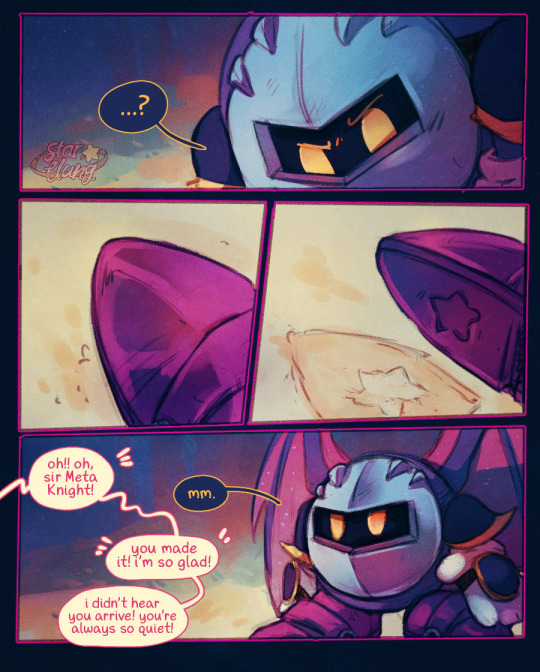
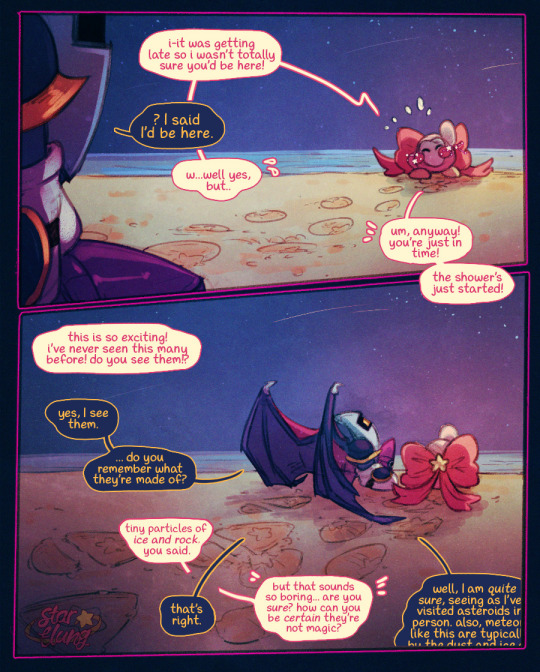
edit: might need to add some additional dialogue to this to make it more clear, but a clarification in the interim; he knows about his own footprints. he's just surprised to see something similar already there when he knows he's only just landed. he lifts his own shoe to confirm that they're not identical (and also to reveal this to the viewer). seems his stoicism beat off the clarity in this one, sorry 😭
#meta knight#starstruck dee#gravitational collapse#have had this one sitting around for *months* while i bit my nails on posting it#and then i thought maybe i *shouldn't* during the shipaganza bc it's not a direct prompt; though i do think you can read it that way#and for ~Reasons~ i needed to post this one sooner rather than later so i had to bite the bullet.#though meta knight has understandably been the second most prompted. they do indeed have the Funnest Possible Dynamic for it#stoic guy and the bug eyed little Creature he doesn't really trust as far as he could throw her (long long way)#so just to clarify this one is NOT for the shipaganza but you can read it that way if you want to#this is just a canon scene between them from her storyline. this is just something they canonically share. starry eyed idiots.#also fwiw i think i probably picked up the shoe-patterns for the knights from postitnotes7#been a headcanon in the back of my mind for a long while but i'm pretty sure i osmosis'd it from their work#especially after drawing post's designs so much for the hnkss. i temporarily forgot how i used to draw their armour ngl#and also btw starstruck deetectives psspsps#i'm planning a much better post about this later (probably in march) but i'm going to start using this tag for Important Posts for y'all#🎀🔍#<- for the starstruck deetectives when there's something significant in the post.#i worry about making it 'too easy' but also want stuff to be accessible. it's just for fun? the OC lore game! ARG but it's just my oc.#that would be fun right? maybe? is that too indulgent? i could probably pull it off if folks were actually interested enough to participate#anyway!! go to bed starflung#also if you read this far: anon is open again! still open for shipaganza prompts but i'm not gonna be finished them in february 😂
214 notes
·
View notes
Text
Et tu, Nico Robin

The way Crocodile reacts to what Robin says here is so interesting though, and I don't mean his decision to kill her, no, I do mean how he reacts
Like yes, as he says a few pages later, he "never trusted anyone from the start", Crocodile had been fully expecting someone would betray him eventually. And that does reflect in his calm demeanor in this whole scene, how he just accepts it and what'll happen next
But what interests me is how he seems almost... slightly sad? Which would be a natural reaction for someone to have if their belief of betrayal being unavoidable and eventual was confirmed like this. But also, it's not really an emotion you'd expect to see from Crocodile (even if it's mild and barely noticable)

Thing is though... Like Crocodile had made it a huge point how He Did Not Interact With His Minions Directly. He went out of his way to hide his identity to ensure success for Baroque Works, that's why he had Robin send out all the orders and borderline running the organization for him. It's why he ordered his agents to go hunt down the Strawhats and stop Vivi, to stop his identity from being leaked out and so that he could take over Alabasta without WG interference. But Crocodile isn't stupid. Surely he must have considdered it. Thought about the possibility. That Robin could've been the one who leaked out his identity to Vivi in the first place, that she had betrayed him already. After all, Robin was supposed to be the only one who knew who "Mr 0" really was.
And so in this moment, when Robin claims the Poneglyph does not mention Pluton at all... I wonder if this would've been confirmation in Crocodile's mind of Robin's betrayal, of her leaking his identity out in the first place. Yes, he says he's getting rid of Robin because she's not delivering on information about Pluton as promised, but that could be because he can't say for 100% certain if his suspicions are right; he can't read the Poneglyph so he can't tell for sure if Robin is telling the truth or if she's lying and intentionally withholding the information. He can't say for 100% certain Robin was the one who leaked his identity out either, it's just that if she had been planning against him this whole time in secret then of course she would refuse to co-operate here, of course she'd withhold the location of Pluton from him.
Had Robin told him Pluton's location here, perhaps Crocodile would've continued to believe (or hoped, at least) that Robin hadn't been the one to backstab him. But Crocodile does not trust others. Even if he can't know for a 100% certain, Robin not delivering on the information he had been promised did make it more likely she had been the one to backstab him to begin with. And this time, unfortunately, he was right in his beliefs. Robin did betray him.
Et tu
#Moon posting#OP Meta#Sir Crocodile#The way he PRAISES Robin for everything she did for him up until now too like#Oh my poor little meow meow oh he look so sad in that panel oh I just wanna hug him#It's not fair Robin should've let him have a weapon of mass destruction and commit mass murder he worked so hard for it :(#(Also yes whomst hurt you before this to make you Not Angry Just Disappointed)#Had I been smart I would have written and posted this for Ides of March but alas. I did not have the energy until now
119 notes
·
View notes
Text
The scent rolled over him.
He looked up.
Overhead, a lilac tree was in bloom.
He stared.
Damn! Damn! Damn! Every year he forgot. Well, no. He never forgot. He just put the memories away, like old silverware that you didn't want to tarnish. And every year they came back, sharp and sparkling, and stabbed him in the heart. And today, of all days ...
— Night Watch by Terry Pratchet
#discworld#night watch#GNU Terry Pratchett#it's not the 25th of may but this fits the 12th of march just as much 😔#the prescient meta relevance of night watch is just... damn
1K notes
·
View notes
Text



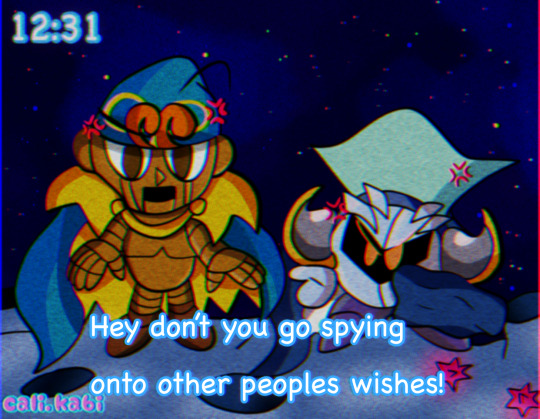
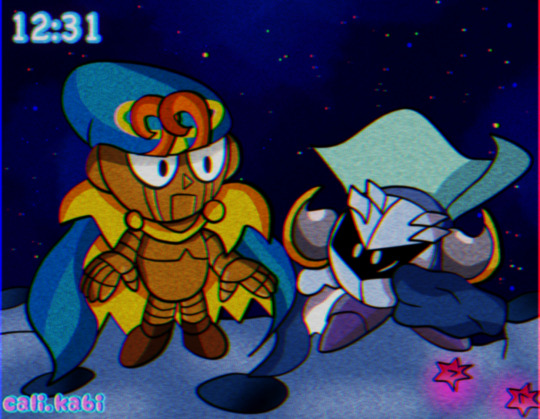

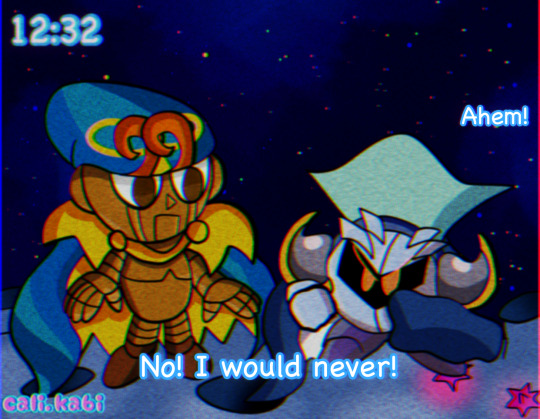
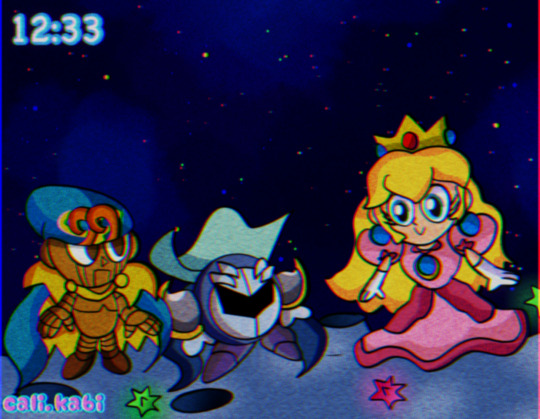
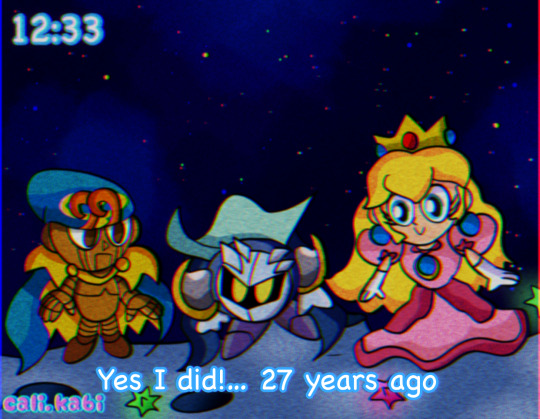
~ Mario RPG and Kirby Super Star both came out in the same year right xD??💫🍄🌟this random idea came to me the other day while I was thinking about RPG and some Kirby <3 Meta Knight made this wish after he lost his battleship to a pink puffball baby alshkdldj so long ago he hopes no one finds out xD💫🌟
#kirby#meta knight#crossover art#super mario rpg#geno smrpg#smrpg#princess peach#super mario world#my art#sydney’s art#kirby fanart#mario fanart#90s anime style#kirby right back at ya#digital art#galaxy art#starry skies#star hill#i just realized both games came out in March 1996 omg ;w;#mario rpg
163 notes
·
View notes
Text
So I think The Last Unicorn is a veritable buffet of Baldur's Gate comparisons for Astarion (Where were you when I was new? / But I do, I regret) but one I haven't seen considered is the parallels between Ascended Astarion and King Haggard.
“All things die when I pick them up. I do not know why they die, but it always have been so, save for the one dear possession that has not turned cold and dull as I guarded it — the only thing that has ever belonged to me.”
Consider a hundred years from now, a thousand years from now, what he will become when the wounds aren't fresh enough to sting. A bitter old man collecting thralls just to look at them, to have them, to own them, slowly becoming more isolated and hiding away in the darkest corners of his palace as he realises nothing makes him happy, not even sunlight. Quietly becoming resigned to it all, waiting for his castle to crumble around him and fall into the sea.
#Astarion#bg3 meta#bg3 headcanons#bg3 astarion#i have loved the last unicorn since forever it's literally haunted me#the MELANCHOLY#but ascended astarion is haggard to me no one can convince me otherwise#his petulance becoming angry and bitter and apathetic over the years#realising everything he's lost and never getting back#the absolution of it all#the relentless march of time that becomes meaningless except to torment him
151 notes
·
View notes
Text
Some “Little Women” thoughts – In defense of Meg’s marriage
@littlewomenpodcast, @thatscarletflycatcher, @joandfriedrich
Whether Little Women is a feminist book or an anti-feminist book will probably be debated forever.
Most of the debate seems to center around the character of Jo: whether she’s depressingly “tamed” in the end or matures in a healthy way, whether her marriage is anti-feminist or not, and whether or not it’s “anti-feminist” that in the end she’s a schoolmistress instead of a famous author. (Though of course she’ll eventually be a famous author in Jo’s Boys.) But similar debate surrounds the other March sisters too, for various reasons.
Not even Meg, the sister whom readers most often seem to overlook, is spared from these debates. Many feminist critics, such as (but not limited to) Samantha Ellis in her book How to Be a Heroine, have criticized the chapters depicting Meg and John Brooke’s married life in Part II. They label those chapters “depressing,” and they feel as if Meg and John are constantly at odds with each other and miserable. They argue that each of their marital conflicts ends with Meg learning to be a more submissive wife who placates and effaces herself for her husband. And they despise John, labeling him “selfish” and “disrespectful.”
Sometimes I wonder if I read the same book that they did.
It seems obvious to me that Meg and John’s marriage is a happy and healthy one: Alcott is just honest about the fact that even the happiest marriage includes conflict and requires work. Some of these critics seem to think fictional marriages only exist in two forms, “perfect” and “toxic,” with no in-betweens. Nor does John deserve half the negative commentary he gets, nor does Meg’s personal growth within her marriage consist of learning to be a submissive or self-effacing wife. On the contrary, much of her growth consists of her learning that she doesn’t need to be a “perfect” housewife and mother who gives and demands too much of herself, and their marriage becomes more of an equal partnership by the end, not less of one.
Let’s look in depth all three of Meg and John’s marital conflicts.
First there’s the jelly incident.
Here we see the first of a recurring theme: Meg is determined to be the perfect housewife and is "over-anxious to please.” She wants to do everything right and do it all by herself, because she’s afraid that otherwise, she'll be a failure. In terms of her personality type, I agree with @funkymbtifiction that Meg is an ESFJ. In the book, if not in all adaptations, Meg and Amy are both ESFJs: Amy is more of the sparkling “Glinda in Wicked” variety, while Meg, apart from her streak of vanity, is more of the down-to-earth, motherly, “Mrs. Potts in Beauty and the Beast” variety. But Meg in particular shows what @alittlebitofpersonality calls the ESFJ Type Angst. Her eagerness to manage her marriage and motherhood in the most pleasant, correct way (her strong Fe and Si) and her fear of possible failure (her weak Ne and Ti) give her, in A Little Bit of Personality’s words, a “frantic desire to do everything and get it done right now,” so she drives herself too hard.
She shouldn’t have promised John that he could bring home a dinner guest at any time; that’s unrealistic. Nor should she have tried to make jelly for the first time in her life using only the memory of watching Hannah make it; she should have invited Hannah over to help her. Nor should she have become so absorbed in making and re-making the jelly that she didn’t cook dinner; nor should she have let herself be so distraught about the failed jelly, or lost her temper with John and then run to her room, leaving him to improvise a bread-and-cheese dinner and entertain Mr. Scott alone.
John is also at fault and acknowledges it. He shouldn’t have forgotten that Meg was making jelly that day and brought home a guest without warning. He shouldn’t have laughed at Meg’s anguish over the failed jelly, nor should he have joked that he and Mr. Scott “won’t ask for jelly” with dinner. But let’s be fair to John. His laughter is probably just as much out of relief as out of amusement, because when he first comes home and finds Meg sobbing, he worries that something terrible has happened. Then, when he realizes no food has been cooked, he’s understandably annoyed because he’s come home from work tired and hungry, with a guest too, and Meg hasn’t done what she promised she would. But he doesn’t lose his temper; he stays calm and amiable and accepts a cold-cut meal; he just gives his annoyance a tiny vent with his joking barb about the jelly. Then Meg overreacts in response.
In the hours afterwards, he and Meg are still polite to each other, just a bit distant, each sorry but waiting for the other to apologize first. Then, when Meg finally breaks the ice, they both apologize (not just Meg – in fact only John verbally apologizes, Meg just does it with a kiss), everything is fine again, and from then on they both laugh about the incident.
Maybe by modern standards, it is problematic that Marmee has urged Meg to be careful not to make John angry and to always apologize first when they’re both at fault. But it’s not because John has “a volcanic temper,” as Samantha Ellis inexplicably claimed– he so clearly doesn’t! Nor is Marmee’s message “Men are less forgiving than women so we need to placate them.” She’s not talking about “men,” but about John the individual, and she’s not urging Meg to placate him either. All she means is that John’s anger doesn’t flare up and die quickly like the March women’s, but simmers much longer because he represses it.
Then there’s the silk incident.
Say what you will about vanity-shaming and other gendered implications (which of course are valid), but Meg didn’t need an expensive silk dress, and she shouldn’t have ordered it without telling John. It’s not that a wife should ask her husband’s permission to spend money; it’s that no one, regardless of gender, should do anything behind their spouse’s back that they’re ashamed to admit. And again, John doesn’t get angry. He accepts the expense without complaining. He’s just hurt; he works so hard to provide for Meg, and the fact that what he provides isn’t good enough for her, that she says “I’m tired of being poor,” makes him feel inadequate. Yet he tries not to show his hurt and is willing to let Meg have the dress. He cancels his own order for a new overcoat so they can afford it; he’s willing to sacrifice something he needs for something Meg wants but doesn’t need. When Meg sells the silk and buys the overcoat for John instead, she’s only repaying his selflessness in kind.
Finally, we reach the chapter “On the Shelf.”
I’ve read several feminist articles that criticize this chapter and especially John’s behavior in it. But I don’t agree with any of them. John isn’t being selfish the way Meg briefly thinks he is; he’s not jealous of her attention to the twins. By all appearances, Meg genuinely neglects him and overwhelms herself too, because she devotes every waking moment to her two toddlers and thinks no one can properly take care of them but herself. Again she’s trying to be superhuman because she’s afraid of failure. She doesn’t let John be a parent to his own children, or take any time to relax either, and she spoils the twins and makes things harder for herself by giving in to their tantrums. I understand why some feminists are rankled when John starts spending his evenings elsewhere, Meg feels ignored, and Marmee tells her it’s her own fault for forgetting ‘her duty to her husband.” But even if that wording isn’t ideal by modern standards, it's arguably true. To blame John for “not bothering” to help take care of the twins and “forcing” Meg to do it all alone, as some of these critics do, is just the opposite of what the chapter means to convey.
And again, John doesn’t get angry or complain. Nor, unlike what some of these critics seem to think, does he cheat on Meg, either physically or emotionally. He just goes to visit the Scotts rather than feel lonely and useless at home (where Samantha Ellis got the idea that he goes to “what sounds like a dodgy establishment” is beyond me; it’s a friend’s house), and just because Meg worries that his eye is roving to pretty Mrs. Scott doesn’t mean it is.
Arguably, this chapter has a very feminist message about egalitarian marriage and co-parenting. Instead of doing all the work alone and sacrificing her own wellbeing, Meg learns to share her parenting duties with John, and to let Hannah babysit often so they can have much-needed time to themselves too. She also starts to converse with John about politics, so he doesn’t constantly feel the need to seek out a male friend to discuss them, and he returns the favor by conversing with her about domestic subjects too. Traditional gender divides are relaxed. By the end of the chapter, their marriage is more balanced and equal than ever.
I’ve also read complaints about John’s co-parenting. The fact that Meg is portrayed as too soft-hearted, spoiling rowdy Demi and needing John to discipline him. The fact that John and therefore Alcott advocates the potentially traumatic “cry it out” method of sleep training. The fact that John insists on handling Demi’s tantrum in his own way despite Meg’s objections and Meg reluctantly gives in, with references to John’s “masterful tone” and Meg’s “docility.” The possible sexist implication that John knows how to parent better than Meg does.
But I don’t think Alcott meant to imply that John is a better parent than Meg or meant us to see him as lording over her. Even though he won’t let her give in to Demi’s demands, what finally stops Demi’s tantrum is a kiss from Meg after he’s been allowed to cry for a few minutes. They solve the problem together by combining John’s discipline with Meg’s tenderness. Then John shows tenderness of his own by lying down on the bed and holding Demi as he falls asleep, so it’s not a straightforward “cry it out” that he (or Alcott) advocates for sleep training, but something closer to the Ferber Method.
Of course there is an old-fashioned, traditional aura to Meg and John’s marriage and to their roles in the house: Meg as homemaker and John as breadwinner, Meg as nurturer and John as disciplinarian to the twins, and her fondness for sitting in his lap. But of the four March sisters, Meg was always the most traditional young woman of her era. Her marriage dynamic might not be what Jo or even Amy would want, but it’s just right for Meg. And Alcott shows us that with the right effort, even a basically traditional marriage can be egalitarian and mutually healthy.
The one feminist complaint I might sympathize with is that all three of these episodes do revolve around Meg learning to be a better wife. In each instance, Meg is portrayed as being more at fault than John, and she’s the one who learns the chief lesson. But I don’t consider this a sexist choice either. The March sisters are the protagonists of Little Women. Their coming-of-age journeys and personal growth are the focal point. John is a supporting character, so it’s arguably only natural that the “married life” chapters focus more on Meg’s personal growth than on his.
These are the reasons why I personally enjoy the chapters revolving around Meg and John’s marriage, and why I don’t consider them problematic or “depressing.” They’re just a realistic portrayal of the struggles, mistakes, and conflicts that occasionally rise within a happy marriage, which are resolved in a healthy way when both partners put in the necessary work. I understand where the critics who dislike those chapters are coming from, but I can’t bring myself to agree.
#little women#louisa may alcott#meta#analysis#meg march#john brooke#marriage#parenting#feminism#rambling
112 notes
·
View notes
Text
Mayor Larry and the events of the 22nd of March 1979
Mayor Larry and Wills father Lonnie Byers are heavily paralleled. Therefore I think it can be worthwhile to examine him and the events of the Fun Fair on July the 4th to possibly get some clues as to what happened on Wills birthday on March the 22nd in 1979.
This is meant response to the birthday gate theory by @greenfiend and you can read up on it here. It's also aligned with the Will Byers has DID theory
Long post ahead and warning for discussions of murder
First let's look at some more general clues a to why I think the two events (Wills birthday in 1979 and Mayor Larrys Fun Fair in 1985) are connected starting with Billys magazines
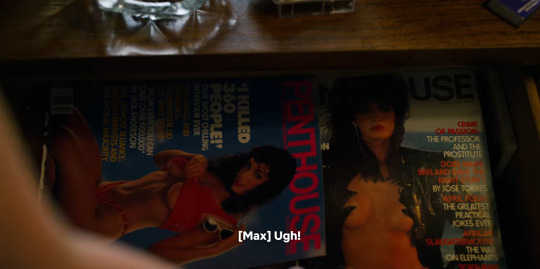
Penthouse
The first clue is major as it tells us of how One killed 360 people. It's the most chilling interview ever. (He likes it cold) 360 may be a bit much but I'll come back to the 36 later. That's an obvious hint for a massacre.
Then we have some other headlines like Sex, drugs and scandals and then something with the lid on Wall Street (Can't make that out exactly but this could refer to the general situation; or it could refer to a Street leading to a wall -> The Demogorgon coming out of the wall or will communication with Joyce through a wall)
How even you can save 100,000 Dollar (A guide to save a lot of people)
An unholy alliance between fascist (?) feminists and the moral majority (That's an interesting one! Was Joyce friends with a woman who wanted her to leave Lonnie? Plus there is the unholy alliance which could indicate that this friend of hers tried to align herself with authorities like the police)
___USE
Crime of Passion: The Professor and the prostitute (Did Joyce have an affair or did someone suspect her to have an affair? I'm also thinking of Neil suspecting that Billys mom was with another man)
Does Mark Breland have the right stuff? (Not sure about this one but it could relate to drugs)
April Fools - The greatest jokes ever (Not sure either)
African slaughterhouse (I don't even want to comment on this)
The war on elephants (not sure either)
can't read the last line
Also the fact that USE is the only word we can make out makes me think that these are things Lonnie might have used in one way or another. Either directly or indirectly.
Then there is this poster at the swimming pool which gave me the idea how the entire plot of S3 may be connected to the massacre in 1979 in the first place.
These posters right there give us so many clues


3rd Annual reworks it says but the 3 is cut in a way where you could also think it's actually an 8 (giving us the 8th annual event show or Wills 8th birthday in 1979)
Erica on Parade (You can't spell America without Erica; makes me think of Erica of cause and all of Wills alters)
76 - 1985 (It started in 76 and it still lasts to the present day in 1985 in Season 3)
Happy Birthday USA (because what is the 4th of July if not a celebration of the birthday of the United States, am I right?)
He held on tight to his Dream (I am sure young Will did, didn't he?)
Thursday 4th of July at 3 PM on Main Street (they give us the exact time and date of the parade)

This is what both the 22nd of March 1979 and the 4th of July have in common. Both are on a Thursday, both celebrate a great event/ a birthday and both bring great festivities.
Therefore I think whatever happened in 1979 was already somewhat foreshadowed in Season 3. I can't piece it all together so bear with me but I will try to collect some clues.
First things first. It didn't start at the 4th of July. It started earlier when Mom and Pop stores started to disappear which caused a lot of upset among the people so they decided to protest. Mayor Larry though thought they're a nuisance and successfully got rid of them.
This however could have had long time consequences as it could have put his reelection in danger so he thought of a trick to make the people forget what happened. He organized great festivities on July the 4th as a distraction. To lift their spirits and make them forget why they were upset in the first place.
It's noteworthy that Larry specifically mentions the disappearance Mom and Pop stores. This happened because Larry was selling off property to the Russians (This could hint that something happened to two people who might be Joyce and Hopper - "mom and pop" - before the party even started.)
Larry and Lonnie share the same name.
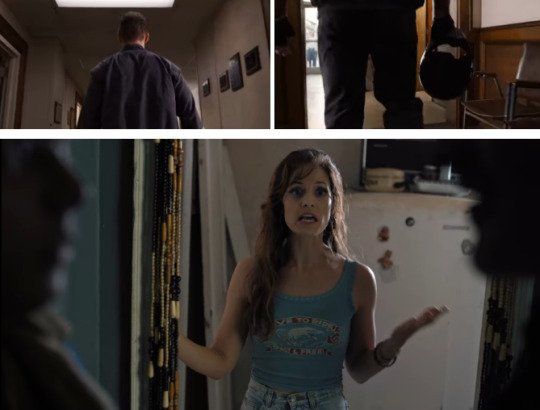
The Russian guy Grigori who visits Larry rides a motorcycle just like Lonnie.
As for the property: Well... Lonnie doesn't have property but he does have sons.
So my guess is that Lonnie did something terrible shortly before Wills birthday in 1979 which caused Will to get really upset and to placate his feelings Lonnie organized a birthday party for him. So all bad feelings will be forgotten and only the positive ones of the party will remain. It's a manipulation tactic.
Before we go on I want to make a quick Interlude to remind us of what Joyce said happened on Wills 8th birthday in 1979
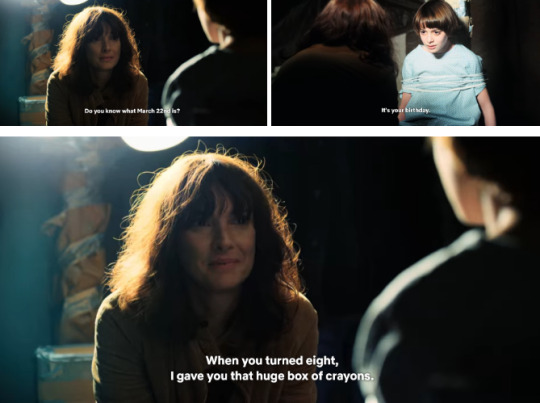
Joyce: Do you know what March 22nd is? It's your birthday. Your birthday. When you turned eight, I gave you that huge box of crayons. Do you remember that? It was 120 colors. And all your friends, they got you Star Wars toys, but all you wanted to do was draw with all your new colors. And you drew this big spaceship, but it wasn't from a movie. It was your spaceship. A rainbow ship is what you called it. And you must have used every color in the box.
Will got a big box of crayons from his mom and drew a big space ship while using every color in the box. His rainbow ship. This is important and this spaceship will play a big part later.
So back to the preparations for the Fair



50s One is here as well as three frogs, two bears who seem to wear traditional Bavarian clothing. A Dirndl which is woman's clothing. Men would wear Lederhosen which would look a bit different.
Another brown bear is in the back as well as something which I cannot make out entirely but looks like a bird to me.
Three frogs make me think of Mike Wheeler who is called Frogface by Troy but he is not the only one here. There are two more members of the frog family which makes me think that Mike wasn't the only one who attended or was supposed to attend the birthday party (My best guess as to who the others are is Nancy and Karen BUT it could also just be Karen and Holly if she was already pregnant at the time)
The two almost identical bears in Dirndl do make me think of the Byers. Bavaria where these clothes are sometimes worn at festivals is called Bayern in german and it's almost pronounced like Byers. As to why they are both wearing traditional woman's clothing I have no idea. There is only one woman in the Byers family and it's Joyce.
The brown bear and the other bird(?) I cannot make sense of.

There is also a Silver Streak Ride and a big bear in the back of a car.

Here we have our Spaceship but it's not turned on yet and Grigori who is the one with the motorcycle is right in front of it.
There is also a 6 printed on the spaceship as well which may indicate that this was used six years prior to the current events (1985) in 1979.
1985 - 6 = 1979


Larry: My friends in state PD, highway patrol, they're all on the lookout. I got eyes everywhere. The second he pops up I get a call. Grigori: A call? Larry: Yes. A call. I mean, what more do you people want me to do? Grigori: We want you to find him.
Larry and Grigori are going inside to talk about Hopper. Grigori and the Russians want to find him. Larrys choice of words is rather interesting. "The second he pops up" Larry gets a call and refers to Hopper who is pop. Remember the disappearance of mom and pop stores? Yeah, that's suspicious. Not to mention the whole phone thing. Larry constantly wants a phone in his vicinity while Will is afraid of phones and phone calls.

Nevertheless while inside they accidentally put the spaceship in motion and get booted into space/ the UD. The ship wasn't meant for them but it brought them there anyway.
It also happens before the big event even starts.



Just after the Fun Fair starts as Major Larry announces the fireworks, Ted, Karen and Holly go on the Farris Wheel. They are riding clockwise to the top. Right when they are at the peak, the ride stops giving them the best view of the fireworks.
It's Ted Wheeler who notices that they stopped and it's Karen Wheeler who's responsible for it. Karen slipped Jimmy a five. She bribed someone with a five to get the best seats in the house. It's Jimmy who took the bribery and this makes me think of Hopper.
But what about the five? I'm not sure but Will was five years old when it all started in 1976. If Karen somehow found out something wasn't right and told the police/Hopper about it it could make sense. (I'm also thinking about the fascist feminist in Billys magazine here. If Joyce had a female friend before it was most likely Karen. Plus Karen also knows it's very dark at night in the Byers driveway making me think she's been there before at night. Most likely to pick up Mike but I do wonder if she saw something else as well)
Then there is still the disappearance of mom and pop before the events. Karen is also a mom. Therefore it might also refer to her.

It's Holly who notices the trees moving in the distance but Karen doesn't want her look at them. She should focus on the fireworks instead. The trees which are moving because because of the Mind Flayer who is a shadowy representation of Lonnie.

Meanwhile Hopper and Joyce also arrive at the Fair and then notice Ted, Karen and Holy broad the Spaceship. They decide to jon them.

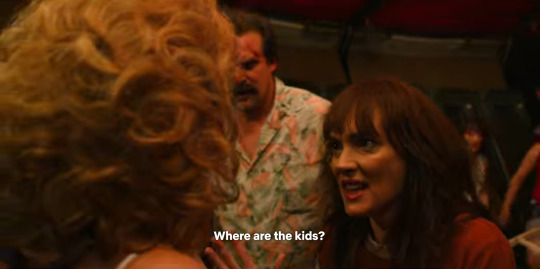
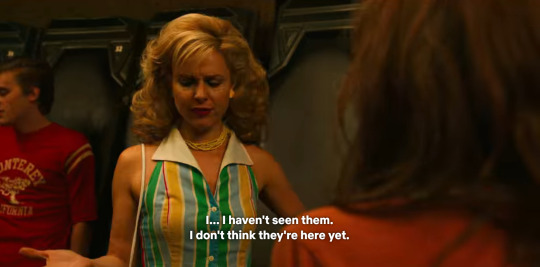
Karen thinks it's funny to see Joyce in the ship. She seems happy to see her but is surprised as well. It's almost like Karen thinks Joyce doesn't belong there. I do think it's noteworthy that she asks this while they on the spaceship. It's the spaceship that is meant to take everyone in and bring them to the UD/ save them so they can live on.
The only thing Joyce wants to know though is where the kids are. They are obviously not on the spaceship. Perhaps this indicates that they should have been there but for some reason aren't. We as the audience do know where they are and what they are occupied with though. They are trying to beat the Mind Flayer in Starcourt Mall.
According to Karen the kids are also not yet here (at the Spaceship or the Fair in general) This could also indicate that they are to arrive later in events that happened in 1979. First some adults died and later a lot of kids also got killed. I am pretty sure though that Karen Wheeler was among those who died back then as she is the only one who seemed comfortable on the ship like she belongs there.



Here we do get a look at the passenger seats and it does remind me of the number of people who were killed by One according to Billys magazine. Seat No. 33 is empty while No. 34 belongs to Karen, No. 35 to Holly, No. 36 to Ted, No. 37 to Joyce and then there is Hopper who's seat number is 8 (because the 8 is the only visible figure)
It's tricky to find out what this means though because if we were to go back in time to 1979 Holly either wouldn't have existed yet or she would have shared her seat with Karen. if Karen was even pregnant back then she must have been in her very first weeks.
Yet according to Billys magazine One killed 36 people meaning that it could have been Joyce who survived for real after all. Or she died at an earlier date and wasn't supposed to be on the spaceship. Again it's the disappearance of mom and pop which make me wonder. (Mom is either Joyce or Karen I'm sure)

Then the spaceship lifts off into space/the UD without the kids but with the parents and Holly instead.
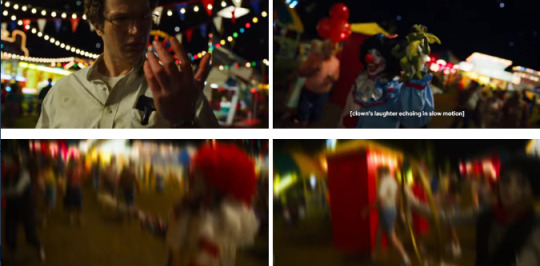
Later on as Alexei gets murdered by Grigori at the Fair he notices two clowns and a mime. I do not know what it means but I do know that young Will was afraid of clowns.
Alexei being Russian and Grigori also being Russian make me think that there may have been a traitor among the Motorcyle gang Lonnie seemed to have dealings with who then got shot at Wills birthday party by his own men.
However with the exception of Murray who then calls for Joyces and Hoppers help no one seems to have noticed Alexei die.
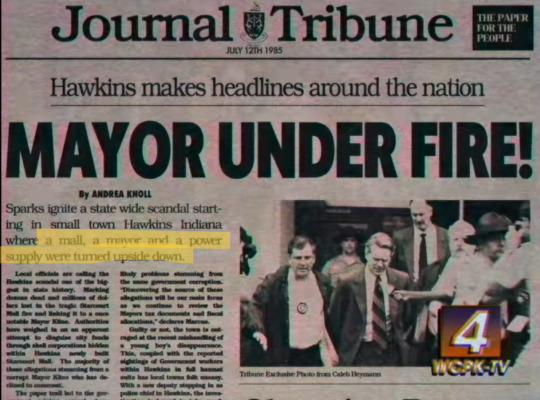
In the end the kids never arrive at Larrys Fun Fair and never entered the Spaceship but that doesn't mean that they are safe as the news tells us that the Mall, the Mayor and a power supply were also turned upside down (were lifted into space and the UD)
I might continue this at a later date but for now I've almost reached picture limit and this post is already too long as it is
#cw murder#stranger things#stranger things theory#joyce byers#jim hopper#karen wheeler#ted wheeler#holly wheeler#larry kline#grigori#will byers#lonnie byers#after everything I still don't know who if anyone at all did#survive the massacre at the 22nd of march 1979#the only thing i am sure of now is that it most likely wasn't karen#my meta#birthdaygate in 1979
15 notes
·
View notes
Text
Okay so we know that Dean was at Sonny’s for two months in the Spring of 1995—it was either March-April or April-May, because the wrestling trophy was April 1995. I think it’s safe to assume the latter, because we know that, while Dean was at Sonny’s, Sam was with Bobby & John was hunting, and that William Harvelle died on May 16th 1995 while on a hunt with John. It seems likely that it was after this hunt that John picked up Sam and then went to get Dean, too, which leads us to the third thing that happened in 1995 (or, I suppose, sometime before January 23, 1996): the hunt Dean told Gordon about from when he was 16.
That scene (In 2x03 (Bloodlust)) is SO interesting to me because even outside of the context of later seasons, the wording and acting are both super interesting: Dean is clearly telling a story and playing it up a bit, but the words themselves aren’t overtly positive; instead, they emphasize that Dean is set apart from normal kids—“seeing things they’ll never even know. Never even dream of.” Gordon is smiling as he listens, grinning as he states that Dean “embraced the life” but Dean’s face is serious & contemplative as he agrees. The acting on both sides makes it abundantly clear that the two have different understandings of “embracing” the life: when Gordon says it, there’s an aspect of enjoyment that isn’t there when Dean is talking about it.
In context, though, and particularly in context of 9x07 (Bad Boys), Dean’s story is even more compelling: by Dean’s own account, he was 16 when this hunt happened, so either he went on this hunt between January and April (or possibly March, depending on when he was at Sonny’s)—before Sonny’s—or, more likely, sometime after he left Sonny’s. If we assume it was after—at most eight months after Dean tasted normalcy and John lost Bill Harvelle—Dean’s words gain another layer, especially the line “I’m sixteen years old. Kids my age are worried about pimples, prom dates…” because, as we know, Dean spent part of his time at Sonny’s getting to know & flirting with Robin, and was going to go to the dance the same night he ended up leaving, only deciding to go when he saw Sam in the Impala with John & knew he couldn’t leave him alone. In light of that, it’s clear that this line is not Dean looking down on the normal life, it’s Dean giving up on something he once wanted, coming to terms with his life as best he can.
In summary: John left Sam and Dean alone, and Dean got caught stealing food for them to eat. Dean went to a home and Sam went to Bobby’s and John went on a hunt and lost a friend. John picked up his boys and kept hunting, bringing Dean with him (putting him in danger, as he well knew considering what had just happened with Bill) while leaving Sam in the car (neglecting him). Dean stood in front of a fire as a body burned and watched as the dreams he’d let himself have for a short time burnt up with it, and even years later, recalling the scene fondly, couldn’t quite manage to sound like he was happy about the idea of letting them go to embrace the life.
#spn#supernatural#dean winchester#spn meta#dean studies#dean winchester character study#dean winchester meta#dean meta#bad boys#spn 2x03#spn 9x07#in honor of the ides of march#here’s a post with a thought that feels like getting stabbed
61 notes
·
View notes
Text
Gale's Folly was seeing he wasn't being as loved as he was loving and internalizing it as a failure of himself as a lover and as a wizard and trying to find a solution that would prove his magical prowess as well as his devotion. That was Gale's Folly™️.
A lifelong ambition to prove himself and a confidence in his magical abilities that tells him he CAN do it is not some irredeemable sin that erases every other avenue of his life stolen from him.
Power, ambition, legacy, safety, and love all feel the same for Gale because the moment he was marked as a child by the Weave those became his core beliefs. Adults coached him to continue that path, rewarded him for it, and gave him the perfect mask (Wizard of Waterdeep) to hide behind if ever any complex feelings he might have had about it caused them discomfort or threatened the loss of Mystra's favor.
I do not need to woob his flaws away. His flaws are so deeply shaped by his lack of agency and grooming. The flaws are the thing!
And he's still a very kind and gentle person, despite all of that, BEFORE romance is on the table.
I'm TORN UP about him!!!



#gale of waterdeep#gale dekarios#galeposting#bg3#bg3 meta#baldurs gate 3#I'm just marching around upset#that people are weird and mean about it#and also it's just he's so good hes so well written#im so gone
117 notes
·
View notes